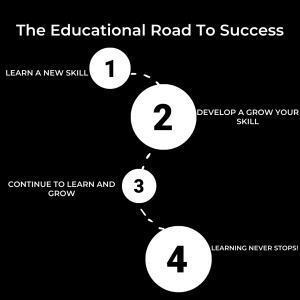The Most In-Demand Job Skills for Recent Graduates in 2025
The job market continues to evolve, and recent graduates must adapt to keep pace. As industries increasingly rely on technology and innovation, specific skills have emerged as essential for those entering the workforce. The most in-demand job skills for recent graduates include digital literacy, critical thinking, and strong communication abilities.
Employers are seeking candidates who can navigate digital tools and platforms effectively. In addition to technical know-how, the ability to analyze information and solve problems creatively is crucial. Building strong interpersonal skills allows graduates to collaborate effectively in diverse teams.
Understanding these key skills can significantly enhance a recent graduate’s employability. By focusing on developing these abilities, they can position themselves as valuable assets to potential employers.
Technical Skills for the Digital Age
In today’s job market, technical skills are crucial for recent graduates seeking to carve out successful careers. Skills in programming, data analysis, and cybersecurity are particularly valuable in an increasingly digital world.
Programming and Software Development
Programming skills are fundamental in various industries. Familiarity with languages such as Python, Java, and JavaScript is highly sought after. These languages are used in web development, app creation, and automating processes.
Recent graduates should focus on understanding frameworks like React for front-end development and Django for back-end applications. Knowledge of version control systems, such as Git, is also essential for collaborative projects.
Participation in coding bootcamps or online courses can enhance these skills. Building a portfolio through personal projects helps showcase abilities to potential employers.
Data Analysis and Management
Data analysis skills empower graduates to transform raw data into actionable insights. Proficiency in tools like Excel, SQL, and Tableau is crucial for analyzing trends and making data-driven decisions.
Understanding statistical concepts and data visualization techniques can set candidates apart. Graduates should also explore programming languages like R or Python, which are beneficial for more complex data analysis tasks.
Familiarity with data management principles ensures effective data handling and security. Organizations increasingly rely on individuals who can manage, manipulate, and interpret large datasets.
Cybersecurity Fundamentals
With the rise in digital threats, knowledge of cybersecurity is essential. Understanding fundamental concepts such as encryption, firewall management, and network security is vital for protecting organizational data.
Graduates should be aware of regulations like GDPR and HIPAA, which govern data protection practices. Training in risk assessment and incident response is also advantageous.
Certifications like CompTIA Security+ or Certified Ethical Hacker (CEH) can provide an edge in job applications. This focus on cybersecurity prepares graduates to contribute to safeguarding sensitive information effectively.
Commercial and Business Skills
Proficiency in commercial and business skills is essential for recent graduates. These skills enable effective management, marketing, and financial strategies, which are highly valued by employers.
Project Management Proficiency
Project management proficiency is crucial in today’s workplace. Graduates must know how to plan, execute, and oversee projects to meet deadlines and budgets. Key competencies include:
- Scheduling: Creating timelines to ensure all tasks are completed on time.
- Resource Allocation: Efficiently managing both human and material resources.
- Risk Management: Identifying potential risks and developing mitigation strategies.
A solid foundation in project management methodologies, such as Agile or Scrum, is advantageous. Utilizing project management software, like Trello or Asana, enhances organizational efficiency.
Understanding of Digital Marketing
Understanding digital marketing is increasingly important as businesses focus on online presence. Key aspects include:
- SEO (Search Engine Optimization): Techniques to improve website visibility on search engines.
- Content Marketing: Creating relevant content to attract and engage target audiences.
- Social Media Management: Using platforms like Instagram and Facebook to build brand awareness.
Graduates should also grasp analytics tools, such as Google Analytics, to assess campaign performance. Knowledge of emerging trends, like influencer marketing, can provide a competitive edge.
Financial Literacy
Financial literacy equips graduates with essential skills for managing budgets and analyzing financial performance. Important components include:
- Budgeting: Developing and maintaining budgets to track income and expenses.
- Cost-Benefit Analysis: Evaluating the potential returns on investments.
- Financial Reporting: Understanding key financial statements, including balance sheets and income statements.
Additionally, familiarity with financial software like QuickBooks is beneficial. Cultivating these skills will help graduates navigate the fiscal responsibilities they may encounter in business environments.
Interpersonal and Communication Skills
Interpersonal and communication skills are crucial for recent graduates. These abilities enable effective interactions in various workplace settings, ranging from IT to sales. Strong skills in this area can enhance collaboration, leadership, and conflict resolution.
Effective Communication Techniques
Clear communication is essential in any industry. Professionals should focus on the following techniques:
- Active Listening: Engaging fully with speakers fosters trust and understanding. This technique helps professionals grasp key ideas and respond effectively.
- Clarity and Conciseness: Graduates must articulate thoughts logically and succinctly. Avoiding jargon unless necessary ensures messages reach diverse audiences.
- Non-Verbal Communication: Body language, eye contact, and facial expressions play a significant role in conveying messages. Being aware of non-verbal cues can enhance communication effectiveness.
In the IT field, precise communication helps in explaining technical concepts to non-technical stakeholders. In sales, clear messaging can directly impact client relationships and sales outcomes.
Leadership and Team Collaboration
Leadership and collaboration are vital in fostering productive team dynamics. Effective leaders guide teams by:
- Setting Clear Goals: Leaders need to communicate objectives that align with the organizational vision. This ensures everyone understands their roles.
- Encouraging Participation: Fostering an inclusive environment allows team members to share ideas. Diverse input can lead to innovative solutions.
- Providing Constructive Feedback: Offering feedback in a respectful manner encourages growth and improvement. This is particularly valuable in a team setting, where collaboration is key.
In sales, strong leadership can drive team motivation and enhance performance. In IT, collaborative projects rely heavily on effective leadership to navigate complex challenges.
Negotiation and Conflict Resolution
Negotiation and conflict resolution are critical skills for maintaining work relationships. Key aspects include:
- Identifying Common Interests: Focusing on shared goals during negotiations can lead to mutually beneficial outcomes. This approach fosters long-term partnerships.
- Maintaining Composure: Professionals should remain calm during conflicts. Effective emotional regulation can lead to clearer thinking and better problem-solving.
- Finding Compromise: A willingness to adapt and make concessions is essential. This skill promotes cooperation and helps resolve disagreements.
In sales, favorable negotiation skills can lead to better deals and client satisfaction. In IT, conflict resolution helps teams overcome obstacles and maintain productivity.


